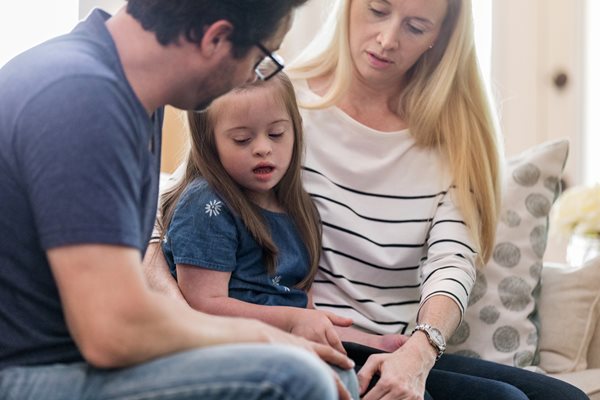
If you’re a PJ Library parent, chances are that you’ve had a conversation with your kids at some point about why your family doesn’t do things exactly the same way that other families do. You may have talked about why Santa doesn’t come to your house, why other kids play soccer on Saturday mornings but you don’t, or perhaps why some of your relatives enjoy bacon cheeseburgers while your family eschews them completely.
As different parts of the world relax (or tighten) social distancing and shelter in place guidelines, you might find that you’re having these kinds of discussions more frequently. My girls are 9 and 11, old enough to understand that different countries and even different states in the US have different rules and guidelines and that they’re changing frequently. Having said that, this can be a confusing time for younger children, or for those with family members, friends, or neighbors who may be making different choices around socializing and social distancing. Your kids may wonder why their friends are having playdates or birthday parties or spending time with cousins when they’re not allowed to.
Here are some easy tips (plus a script if you need it) to follow when your children ask: “Hey, why can their family do that but we can’t?”:
- Get clear on your family rules--or at least as clear as you can. Discussing your guidelines with your parenting partner or other caregivers before talking with your children will help you avoid power struggles during the conversation.
- Be straightforward. Use clear, unambiguous language and don’t make promises you can’t keep. It can be as simple as, “We’re not having playdates with friends right now because it’s an important way to keep people healthy.”
- Acknowledge that different states and even different families have different rules. You don’t need to beat around the bush or minimize the differences. If you know why some folks are doing things differently--perhaps a friend still goes to daycare because his parents are both first-responders--you can say that. If you don’t know why, then you don’t have to guess or shame other folks for their choices. Just come back to the reality that “different families have different rules.”
- Focus on the feelings, not the fight. Rather than getting into a debate about whether or not your children can engage in a particular activity, get curious about their emotions. Let it be okay for your children to be sad or mad or whatever they need to be. Remember that although some feelings are unpleasant, none of them are wrong.
- Bring it back to values. If your child is getting fixated on, and frustrated by, the constant (and frequently confusing) changes, remind them why we’re doing this. We’re staying home and wearing masks and washing our hands because we value life above everything else, and we can each do our part to help keep the people we love healthy and safe.
Here’s an easy script to follow that keeps the focus on your family:
“Each family has its own rules. In our family we believe that [Insert topic item] works best for us.” Or “In our family, [name your family rule] works best for us.”
For more resources about talking to children during this unusual time, check out:
How to Talk to Your Children About Cancelled Summer Plans
Is Social Distancing a Jewish Value?
5 Trusted Resources for Talking to Your Kids About COVID-19
About the Author
Carla Naumburg, PhD, LICSW is a clinical social worker, writer, and speaker. She is the author of three parenting books: Ready, Set, Breathe: Practicing Mindfulness with Your Children for Fewer Meltdowns and a More Peaceful Family (New Harbinger, 2015) and Parenting in the Present Moment: How to Stay Focused on What Really Matters (Parallax, 2014), and the bestselling How to Stop Losing Your Sh*t With Your Kids (Workman, 2019). Her writing has appeared in The New York Times, The Washington Post, The Huffington Post, and Mindful Magazine, among other places. Carla lives outside of Boston with her husband, two young daughters, and two totally insane cats.
May 18, 2020